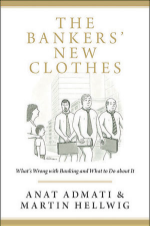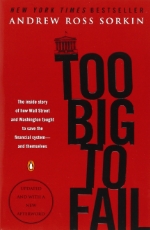After the Music Stopped: The Financial Crisis, the Response, and the Work Ahead, by Alan Blinder, January 2013.
Alan S. Blinder—esteemed Princeton professor, Wall Street Journal columnist, and former vice chairman of the Federal Reserve Board under Alan Greenspan—is one of our wisest and most clear-eyed economic thinkers. In After the Music Stopped, he delivers a masterful narrative of how the worst economic crisis in postwar American history happened, what the government did to fight it, and what we must do to recover from it. With bracing clarity, Blinder chronicles the perfect storm of events beginning in 2007, from the bursting of the housing bubble to the implosion of the bond bubble, and how events in the U.S. spread throughout the interconnected global economy. Truly comprehensive and eminently readable, After the Music Stopped is the essential book about the financial crisis.
The Bankers' New Clothes: What's Wrong with Banking and What to Do about It, by Anat Admati & Martin Hellwig, February 2013.
The past few years have shown that risks in banking can impose significant costs on the economy. Many claim, however, that a safer banking system would require sacrificing lending and economic growth. The Bankers' New Clothes examines this claim and the narratives used by bankers, politicians, and regulators to rationalize the lack of reform, exposing them as invalid. Anat Admati and Martin Hellwig argue that we can have a safer and healthier banking system without sacrificing any of its benefits, and at essentially no cost to society. They seek to engage the broader public in the debate by cutting through the jargon of banking, clearing the fog of confusion, and presenting the issues in simple and accessible terms.
The Big Short: Inside the Doomsday Machine, by Michael Lewis, May 2010.
From the author of The Blind Side and Moneyball, The Big Short tells the story of four outsiders in the world of high-finance who predict the credit and housing bubble collapse before anyone else. When the crash of the U.S. stock market became public knowledge in the fall of 2008, it was already old news. The real crash, the silent crash, had taken place over the previous year, in bizarre feeder markets where the sun doesn’t shine and the SEC doesn’t dare, or bother, to tread. Who understood the risk inherent in the assumption of ever-rising real estate prices, a risk compounded daily by the creation of those arcane, artificial securities loosely based on piles of doubtful mortgages? In this fitting sequel toLiar’s Poker, Michael Lewis answers that question in a narrative brimming with indignation and dark humor.
Boomerang: Travels in the New Third World, by Michael Lewis, September 2011.
As Pogo once said, "We have met the enemy and he is us." The tsunami of cheap credit that rolled across the planet between 2002 and 2008 was more than a simple financial phenomenon: it was temptation, offering entire societies the chance to reveal aspects of their characters they could not normally afford to indulge.
Icelanders wanted to stop fishing and become investment bankers. The Greeks wanted to turn their country into a piñata stuffed with cash and allow as many citizens as possible to take a whack at it. The Germans wanted to be even more German; the Irish wanted to stop being Irish.
Michael Lewis's investigation of bubbles beyond our shores is so brilliantly, sadly hilarious that it leads the American reader to a comfortable complacency: oh, those foolish foreigners. But when he turns a merciless eye on California and Washington, DC, we see that the narrative is a trap baited with humor, and we understand the reckoning that awaits the greatest and greediest of debtor nations.
Bringing Down the Banking System: Lessons from Iceland, by Gudrun Johnsen, January 2014.
The combined collapse of Iceland's three largest banks in 2008 is the third largest bankruptcy in history and the largest banking system collapse suffered by any country in modern economic history, relative to GDP. How could tiny Iceland build a banking system in less than a decade that proportionally exceeded Switzerland's? Why did the bankers decide to grow the system so fast? How did businesses tunnel money out of the banking system? And why didn't anybody stop them? Bringing Down the Banking System answers these questions. Gudrun Johnsen, Senior Researcher with Iceland's Special Investigation Commission, tells the riveting story of the rise and fall of the Icelandic banking system, describes the commission's findings on the damaging effects of holding company cross-ownership, and explains what we can learn from it all.
Fault Lines: How Hidden Fracturs still Threaten the World Economy, by Raghuram G. Rajan, August 2011.
Raghuram Rajan was one of the few economists who warned of the global financial crisis before it hit. Now, as the world struggles to recover, it's tempting to blame what happened on just a few greedy bankers who took irrational risks and left the rest of us to foot the bill. In Fault Lines, Rajan argues that serious flaws in the economy are also to blame, and warns that a potentially more devastating crisis awaits us if they aren't fixed.
Fool's Gold: How Unrestrained Greed Corrupted a Dream, Shattered Global Markets and Unleashed a Catastrophe, by Gillian Tett, June 2009.
From award-winning Financial Times journalist Gillian Tett, who enraged Wall Street leaders with her news-breaking warnings of a crisis more than a year ahead of the curve, Fool's Gold tells the astonishing unknown story at the heart of the 2008 meltdown.
Too Big To Fail: The Inside Story of How Wall Street and Washington Fought to Save the Financial System--And Themselves, by Andrew Ross Sorkin, September 2010.
In one of the most gripping financial narratives in decades, Andrew Ross Sorkin-a New York Timescolumnist and one of the country's most respected financial reporters-delivers the first definitive blow- by-blow account of the epochal economic crisis that brought the world to the brink. Through unprecedented access to the players involved, he re-creates all the drama and turmoil of these turbulent days, revealing never-before-disclosed details and recounting how, motivated as often by ego and greed as by fear and self-preservation, the most powerful men and women in finance and politics decided the fate of the world's economy.
When Genius Failed: The Rise and Fall of Long-Term Capital Management, by Roger Lowenstein, January 2001.
In this business classic—now with a new Afterword in which the author draws parallels to the recent financial crisis—Roger Lowenstein captures the gripping roller-coaster ride of Long-Term Capital Management. Drawing on confidential internal memos and interviews with dozens of key players, Lowenstein explains not just how the fund made and lost its money but also how the personalities of Long-Term’s partners, the arrogance of their mathematical certainties, and the culture of Wall Street itself contributed to both their rise and their fall.








